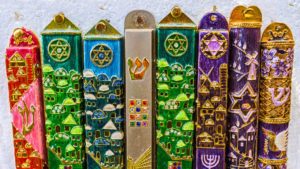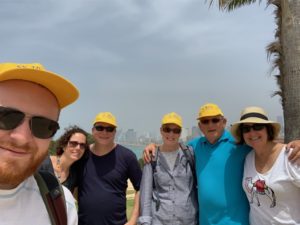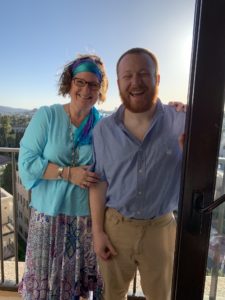MyZuzah Wants To Bless Every Jewish Home in the World
Our homes are our castles–even more than that– our homes are our sanctuaries and the foundation of our Jewish lives.
Some of our fondest childhood memories take place in the home…lighting the Hanukkah menorah and displaying it in the window, gathering together for Shabbat, building a sukkah in our backyard are just a few ways build our Jewish identity for generations to come. Continue reading
Dreaming of Coronavirus and Casseroles Keep Me Up At Night
 Two main things keep me up at night. First and foremost, the health and safety of my family. Secondly, what to make for dinner. Also, hot flashes. So technically that’s three things that keep me tossing and turning in bed while everyone else is sleeping. Continue reading
Two main things keep me up at night. First and foremost, the health and safety of my family. Secondly, what to make for dinner. Also, hot flashes. So technically that’s three things that keep me tossing and turning in bed while everyone else is sleeping. Continue reading
Tisha B’Av, A Time To Rebuild Our Inner Sanctuary
If ever there is an appropriate time for communal mourning, it is now, in the midst of a global pandemic. On July 29 at sundown marks the saddest day of the Jewish calendar, Tisha B’Av, which commemorates the many catastrophes that have befallen the Jewish people at this very time throughout our history.
Tisha B’Av is not a holiday of joy, but rather an anticipation of better days to come. This perspective sheds light and gives us hope in our modern day tragedy. Pandemic, protests, politics…we are in a war amongst ourselves.
Tisha B’Av, which literally means the ninth of the Hebrew month of Av, is a time to remember the destruction of the two holy temples in Jerusalem almost 2,000 and 2,500 years ago, as well as other calamities that sought to break our soul and destroy us. We remember these tragic events that include the expulsion of the Jews from Spain in 1942, the start of World War I and the ensuing tragedy of both Worlds Wars that lead to the Holocaust, and more HERE.
The exile lasted up until the Six Day War in 1967 when, after a battle, the Western Wall became ours again. Today, the world is under siege by the fallout of COVID-19. The novel coronavirus continues to wreak havoc on humanity on all fronts–physically, emotionally, economically, socially, morally, and ethically. We were not prepared for this causing much pain, suffering, fear and uncertainty. And tragically, we are our own worst enemy. Continue reading
Juneteenth Shabbat, The Jewish Connection to Black Freedom
This Friday night, Shabbat coincides with Juneteenth, the commemoration of the official ending of mass enslavement of African Americans, an event which took place on June 19, 1865, in Galveston, Texas, three month after the conclusion of the Civil War and more than two years after President Lincoln signed the Emancipation Proclamation. Juneteenth is the oldest-known commemoration of the end of slavery in America, with a sordid past that continues to enslave the very people whose ancestors were forced to leave their homeland in order to build our country. Watch the video below for a good explanation, and then read 12 Things You Might Not Know About Juneteenth.
If any tribe can relate to a tumultuous journey of slavery to freedom, it’s the Jews. That’s why Jewish people have an obligation to understand and seek justice and equality for the black community who is hurting right now. Here’s how you can honor Juneteenth at home.
I have a confession. Even though “Juneteenth†appears on my calendar app as a national holiday, like Father’s Day this Sunday and Independence Day next month, I never knew what this annual holiday on June 19th was all about. We didn’t learn about these historical events in school, and as an adult I never bothered to find out more. If it wasn’t for the Black Lives Matter movement, many white people would still be clueless about Juneteenth and the continuous systemic supression of the black community.
Juneteenth, also known as Freedom Day, Jubilee Day, Liberation Day, Emancipation Day, matters to all of us, and this short, fascinating video shows us why:
Time to Rest and Recharge–It’s Shabbat
Our country, our world, is in turmoil. Protests, both peaceful and destructive, are on the rise right along with the surge of coronavirus. The days are stressful and confusing, and many people are sick and suffering. The good– people of all races, colors, religions, and generations are unifying and standing up for racial equality, social justice, and policy reform. The bad–government and police struggle to maintain control, while malicious radicals take advantage of the chaos. While people are coming together, there is still much division, anger, and emotion tearing us apart. We need law and order to live in a free society, but how we get there remains an elusive ethical dilemma one of the many themes of this week’s Parshat Behaalotcha.
We have a long way to go. but the conversation is started, and there is hope. And there is Shabbat.
In the famous words of Ahad Ha’am, founder of cultural Zionism:  “More than the Jewish People have kept Shabbat, Shabbat has kept the Jews.â€
Shabbat does not make any of the pain go away, but rather a brief period of time to rest and recharge so we can forge ahead in the next week with a renewed engergy and purpose. Shabbat has sustained the Jewish people since the beginning of time, allowing us to turn down the chaos and turn on our connection to God. When life around us seems so out of control, Shabbat is the one constant. The strike of a match that begins and ends Shabbat is the light that permeates the darkness and helps us see things clearer and with greater understanding.
And from Warren Goldstein, chief rabbi of the Orthodox Synagogues of South Africa and founder of the Shabbat Project, “Whatever Jews have gone through or are dealing with today, Shabbat is a reminder that for a 25-hour period, there is a need to disconnect from the world, reintegrate with family, be part of a community, and connect with God.â€
On Friday nights, my son usually comes over for dinner and stays overnight, and I make a special meal and of course challah. I even pour grape juice into a purple glass decanter for my husband (wine gives him a stomachache).  After the last bite of fudge brownie for dessert, my son and I sometimes venture into the living room, which I call the “Shabbat Parlor,†and we casually talk about the Torah portion while my toy poodle Beau snuggles contently on my lap. At some point in the night, Jack goes for a walk on his own to the common ground down the street. The moon hangs in the sky and there is a quietness in the air except maybe sounds of crickets and a croaking toad. This is where Jack comes to pray, joined only by a deer grazing nearby. I call it “davening in the corn field.â€
During Shabbat, Jack shares what he learned from the commentaries of some of his favorite Rabbi teachers, including Jonathan Sacks, David Wolpe and Rashi to name a few, while I usually rely on the summaries of Chana Weisberg’s Shabbat deLights or the many wonderful Zoom webinars from orthodox to reform, including Aish St. Louis and Congregation Shaare Emeth where I know the clergy personally. Sometimes we have our talks during our walks around the neighborhood, this is our uninterrupted time together, a safe place to share what’s on our minds. My husband and daughter prefer to do their own thing, and that’s OK, they are always welcome to join our deep conversations.
Even though currently we are not gathering in person in our communities because of coronavirus, there are many ways to stay connected, including Project Inspire, which allows Jews around the world to turn Friday night into Shabbat with inspirational speakers, musical performances, special guests, and even cooking demos to get us hungry for more.  I often tune into the one-hour program while I’m cutting up fruit or setting the table.
Shabbat has the most ancient roots in Judaism, but the universal message is more relevant than ever before. In the onslaught of modern technology, social media, and nonstop CNN, Shabbat gives us permission to turn off the noise and connect with God and our Jewish values that shapes how we perceive the world and guides us to how we fit in.
Go HERE to download a guide to bringing Shabbat home, whether you’re a host or a guest, or having an intimate celebration with your immediate family.
In  Parshat Beha’alotcha, Hebrew for “when you step up,” we read the story about the Israelites crying out again complaining about the miserable conditions of the desert. They complained to their leader Moses that there was nothing to eat besides manna and they wanted meat and fish and fruits and vegetables like they ate in Egypt. It’s as if they forgot how unbearable their life was as slaves in Egypt. Now that they are free, and have manna to eat and this substance from heaven tastes like whatever they crave, the Jews are also obligated to follow the laws of the land, the commandments.
Moses heard their weeping and begged God, “Why have You placed the burden of this entire people upon me. I alone cannot carry this entire nation, for it is too heavy a burden.â€
God said to Moses, “gather seventy men from among the elders of Israel and have them stand with you at the Tent of Appointed Meeting. They will then bear the burden of the people with you. As for the people complaining that life was better for them in Egypt, tell them that God will provide meat. Tell them it will be so much meat that they must eat it for a whole month until it comes out of their nostrils and makes them nauseated. Tell them it is because you have rejected Hashem who is in your midst and you have wept before Hashem saying, ‘Why did we leave Egypt?’â€
The meaning of  the Torah go below the surface, and one midrash suggests that in Beha’alotcha the complaints of the Jewish people is not so much about their physical needs but more about freedom. The word “free†in this Torah portion means “free of divine precepts,†meaning they are responsible for their own actions and for following the laws of the Torah, which requires great social responsibility. And perhaps it means that while change starts by taking individual responsibility, we all must stand together as one people, one nation, and this is never more true than during a time of protest in a pandemic.
Shabbat Shalom, may you find peace, comfort, and reassurance that we are here for a reason and that unity is a verb, not a noun, and we all have a role in making this world a more equal, kinder place.
Counting Upward, The Spiritual Journey to Shavuot
Shavuot, a Jewish holiday that celebrates the revelation of the Torah on Mount Sinai, is around the corner but Jews have been diligently preparing for this moment since the second night of Passover.
The word Shavuot (or Shavuos) means “weeks,” and the Torah invites us on a seven-week, soul- searching journey known as Sefirat HaOmer–that’s when we count up to the days of Omer. This 49-day time period is meant to be a workout of the human psyche so that our soul is in better shape to receive the vast wisdom in the Torah that was entrusted to us by God. We count up–not down–because each day we ascend to a level higher of spiritual refinement, each day we take one step closer to becoming God’s chosen nation. Living in a Covid pandemic world right now, we are doing a lot of counting. We are counting 100,000 American lives lost to this virus that we didn’t even know existed a year ago. We count days in quarentine, days until another part of the economy reopens. During this time, more than anything,  we are reminded that  every day counts, every person counts, every act of kindness counts, every growing pain counts, and, every blessing counts.
Chag Sameach–It’s Yom Yerushalyim, Jerusalem Day!
As Jewish people all over the world come together (virtually) for Yom Yerushalayim, Jerusalem Day, I reflect on where I was at this time last year. And that was the City of Gold, visiting my son who lived in Israel while teaching English to Israeli children in middle school.
And now, a year later, Israel is just starting to reopen after quarantining for several months because of coronavirus. I may live thousands of miles away in St. Louis, but like many Jews I always feel connected and at home in Israel.
Eishet Chayil, “Woman of Valor,†The Ultimate Mother’s Day Poem
This Mother’s Day is unusual—every day is unusual—because the covid pandemic continues to separate many of us from our loved ones. For many families, their mothers and children are apart, and social distance parties and Zoom meetings are the next best thing to actually being together physically. This Mother’s Day, I will be celebrating with my husband and our son Jack, who promised to whip up something creative for dinner, maybe a ginger cocktail, deviled egg appetizer, squash salad, and some kind of chicken drizzled with a tzatziki sauce that is all plated like a fine Mediterranean restaurant. I will be missing our younger daughter Sari who is away at pharmacy school studying for finals.
On this Mother’s Day, I am beyond grateful that I am healthy and so is my family, so truly this is the greatest gift of all.  All I ask for, besides a little adulation for holding down the fort during these last two months of quarantine, is a lilac bush planted in the backyard so I can inhale the sweet fragrance with every gentle breeze.
On every Friday night, when we welcome the Sabbath Queen, we have an opportunity to celebrate Mom every singe week–it’s called Eishet Chayil (pronounced aish-et chai-eel or eishes chayil), translated to “Woman of Valor,” and this poem written thousands of years ago by King Solomon pays homage to the matriach of the family like no other words can. Continue reading
From Mourning To Celebration, Israel Teaches Us Resilience
During these challenging times of corona, every day, every hour, is unpredictable. Sometimes fear and sadness seem to overlap with laughter and happiness, all in the same moment. Our resilience is being tested right now. Even in the darkest hour, we have faith that there will be light again. This strength is never more evident than how the Jewish people transition from Yom HaZikaron (Israel’s Memorial Day) to Yom Ha’atzmaut (Israel Independence Day), which is April 27 and 28 this year.
In the time span of a week, Israel goes from mourning the six million Jews who perished during the Holocaust (Yom HaShoah), to the next week remembering the soldiers who sacrificed their lives , Israel Memorial Day, to the very next day celebrating Israel becoming a state, Israel Independence Day,  Yom Ha’atzmaut. Typically these momentous events draw crowds of people, but during the pandemic lockdown the many ceremonies took place in empty venues and were broadcast online, allowing the world to witness how a nation comes together in solitude in the worst and best of times. This trajectory of lows and highs, our ability to adapt and to never give up, has led to the survival of the Jewish people. And this is the kind of strength that we all need to embrace during the global health crisis. Â










